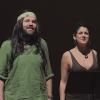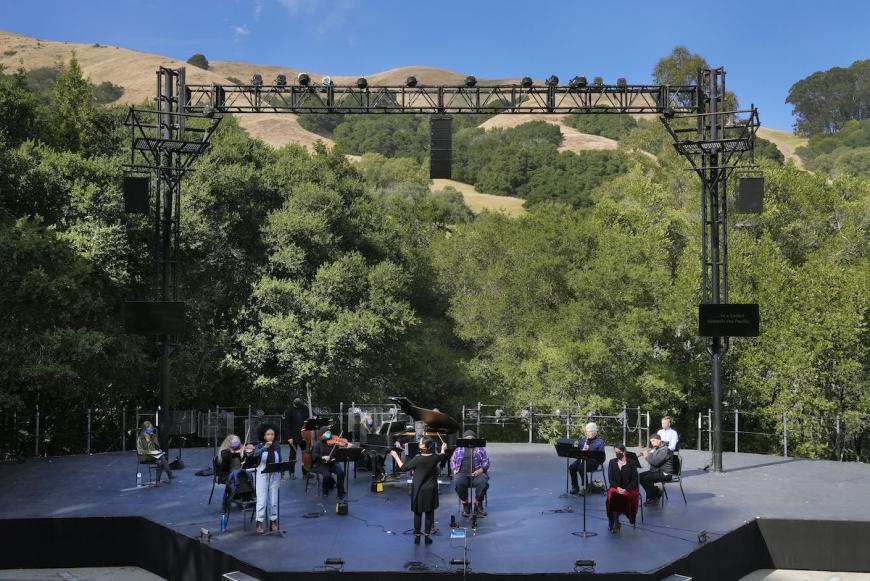
Deprived of their customary musical diet for over a year, audiences are clearly hungry for live performance. On May 15 and 16, two masked, well-bundled and socially distanced crowds traveled to Orinda’s breezy Bruns Amphitheater for an abundantly well-stocked late afternoon buffet courtesy of West Edge Opera.
Snapshot, as the company’s annual sampling of new operas in development is billed, served up 20-minute (or so) excepts from six diverse works. Tastes differ, of course, but it’s hard to imagine that anyone came away without something delectable to remember — and anticipate, if and when full versions of these pieces come to pass.
In the California Shakespeare Theater’s dramatic hilltop venue, where West Edge will mount three fully staged operas this summer (July 24 – August 8), groups of two to five singers gave voice to operas as different in theme and setting as they were in musical style and temperament.
The performers may have been positioned behind music stands and singing from scores, but when something took hold — a grippingly dramatic aria by tenor Kevin Gino in composer/librettist Noah Fram’s war-haunted The Glass Cage; soprano Shawnette Sulker’s breathtakingly delicate solo in composer Nathaniel Stookey and his co-librettist’s Eisa Davis’s poetic Bulrusher, set in Mendocino County in the 1950s — the workshop trappings dropped away. Here, in concentrated form, was opera’s hard-wired power to connect. Seven players from Earplay, the longtime Snapshot band, provide deft orchestral support throughout the proceedings. Mary Chun, Jonathan Khuner, and Emily Senturia shared conducting duties.
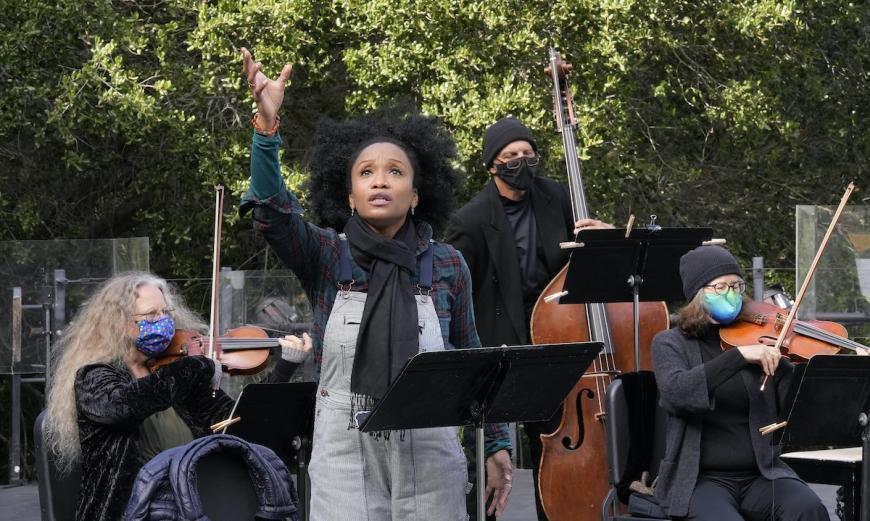
Two of the six selections offered especially enticing glimpses of what might lie ahead. In Bulrusher, after Sulker’s evocative suggestion of a young Black woman’s uncertain footing in a small town, baritone Jo Vincent Parks’s logger bargained testily with a stubborn brothel owner (mezzo Deborah Rosengaus) over the price of a night’s pleasure. You could feel a whole community coming into view, tinted by the lyrics’ local-color dialogue and flinty humor. Stookey’s resourceful music segued from gently swaying strings to edgily percolating rhythms and effusive expansions.
In Ten Minutes in the Life or Death of ..., composer Tyler J. Rubin and librettist Marella Martin Koch turned inward and introspective. The expressive Gino teamed up with fellow tenors J. Raymond Meyers and Chad Somers, all three playing prismatic aspects of the same character. In a poignant score and pointed lyrics reminiscent of Sondheim, the collaborators defined a liminal space of a man “breaking into pieces” as he sifts through childhood memories and philosophical musings. Rubin’s melodies kept torquing and probing, quizzical and wonderstruck. A single piano note, repeated over and over, became a transfixing musical image of a mind and body ‘lingering.”
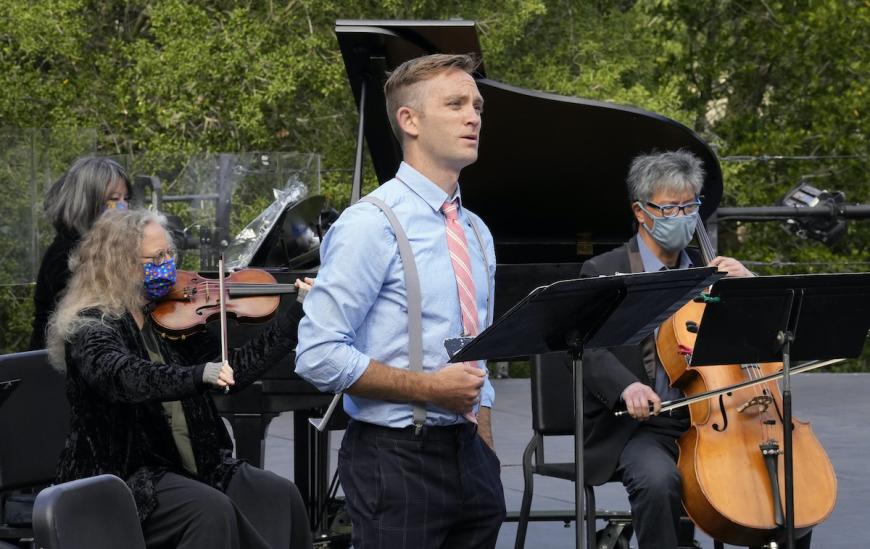
Both The Glass Cage, which dealt with sexual assault and PTSD in the military, and Invisible (music by Guang Yang, libretto by Paula Cizmar), with its female-centric storyline about art, myth and sexual violence, had a lot on their respective plates. While it was impossible to guess how such ambitions might play out, both works offered some intriguing indicators.
Fram’s eclectic score (jazz, hip-hop, show tunes, patter songs) had a restless drive, peaking in Gino’s anguished lament. Accompanied only by a violin, soprano Julia Hathaway and mezzo Erin Neff engaged in some layered conversation centered on a forthcoming art exhibit. Ethereal art works, the tragic tale of Medusa, and real-world griefs shuttled in and out of view in a cross of class lecture and therapy session. In one lovely touch, the violin’s double stops limned the younger woman’s dual vision of herself.
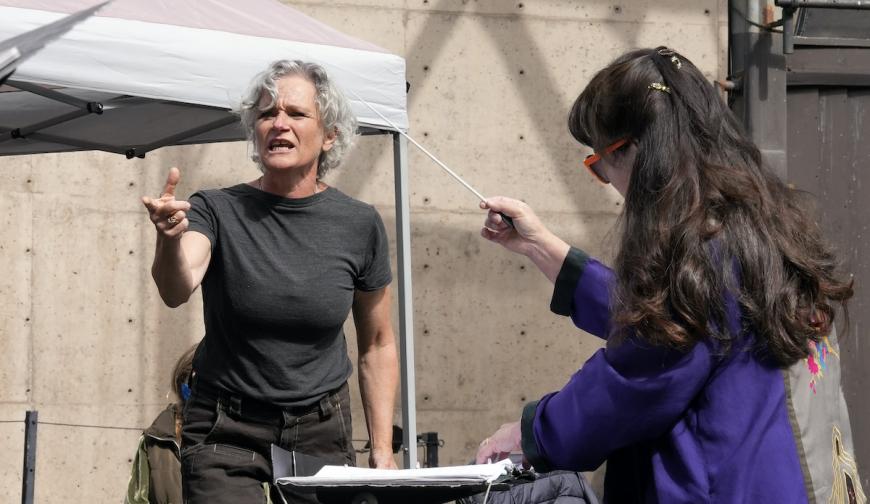
This Lingering Life, which opened the afternoon, tapped Noh plays for its material and formal inspiration. Anne LeBaron’s music had its cryptic charms and touches of skeptical humor, but the piece felt a little studied at this point. The Promise (music by Peter B. Allen, who shared libretto credit with George Pfirrmann) labored under a contrived and cliché-riddled text about family promises and a somewhat cloying score.
Snapshot, taken in its proper spirit, should not be about snap judgments, one way or the other. It’s about opening doors, looking inside, and wondering what might be. It’s about hope in other words, just the thing to whet a pandemic-addled music lover’s appetite.



